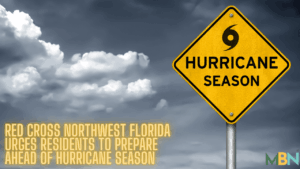

Another Boat has begun its descent to the shallow bottom of Tom’s Bayou in Valparaiso – after the boat was abandoned near the northern shore of the bayou on September 15th.
The boat called the ‘Spiffy’ (no, I can’t make this stuff up) laid to rest on the bayou floor about five feet from shore. It’s visible from the Tom’s Bayou bridge as you drive away from Eglin Air Force Base.
As you might’ve guessed – there wasn’t anyone around to answer on behalf of the abandoned and sinking boat when we arrived on the scene Tuesday morning.
This is the fourth such incident in the bayous around the cities of Valparaiso and Niceville – and continues to be an issue for the environment and local boater safety. According to the Valparaiso Police Department’s Chief, Joe Hart, the boat’s status has become an active Florida Fish and Wildlife Commission (FWC) and Coast Guard mission. As of Wednesday, September 21st, the boat was still in the bayou, but the FWC and the Coast Guard drained the boat of sewage to reduce the environmental impact of the boat.
RELATED: National Rankings Name Valparaiso #18 City in America For Outdoor Living
“It’s a growing problem, and [boat abandoners] are choosing our city as a dumping ground because of lax protections and enforcement,” said Valparaiso resident Neal Shermer. Shermer, a former Valparaiso City Commissioner, has raised the issue to the commission’s current members.
But, no city ordinances or rules have been changed in an effort to reduce the number of abandoned sunken boats – which can destroy the ecosystems in and near the waters where boats are dumped. In the past, Shermer has suggested a deposit be placed by boaters who want to anchor for a longer period of time in water next to the city as collateral – so they won’t disappear and leave taxpayers to deal with the problem once the boat sinks. Shermer also suggested outfitting the police force with a boat to give them the ability to quickly assess the situation on sinking boats and determine whether or not they need to be towed.
Shermer believes it’s way cheaper in the long run for the city to buy a boat and dedicate at least some of a Val-p officer’s time to enforcement on the water.
Changes state lawmakers in Tallahassee made in 2018 now allow for Valparaiso PD, or any other local law enforcement agency, to deal with sinking vessels next to their jurisdictions. This law specifically says that they can order a boat towed if:
According to the law, a boat owner that does anything like this is liable for a noncriminal infraction. Ultimately, the law says, the goal of the legislation is to “prevent vessels being neglected or in deteriorating condition from reaching a likely and foreseeable state of disrepair.”


But while the plan is legit, according to state law – that doesn’t mean it’s a done deal – not in the slightest, according to Valparaiso Police Chief Joe Hart.
Chief Hart says that Shermer’s Plan to augment his police department with a marine branch isn’t feasible because he can’t find enough officers to fill the billet on land.
RELATED: Valparaiso Mayor Brent Smith Talks The Next Four Years.
Currently, the City of Valparaiso has allocated enough funding for 12 officers and seven support staff within the police department. But, Hart says, his office is perpetually short on officers. Right now, he is down two uniformed officers and two support personnel. Add on top the fact that most people at the department have more than one job already – and it’s a hard sell for the Chief to see that department should add more responsibilities on top of the ones he says they feel the manpower shortage has strained them with.
For comparison, the City of Niceville allocated funding for its department to have a total of 32 officers. They have 24 on staff as of August. That’s about 75% staffed. The Valparaiso Department is about a third of the allocation at 12 slots – and has about 82% of those slots filled.
“If it’s possible in the scope that I have resources to do, I don’t mind taking on those tasks,” Hart said, “but if it’s a task that I don’t have the resources to do, why would I set up the city for failure when I can ask for help from other agencies to do it.”
Hart argues that FWC has done a relatively good job patrolling the waters and has the requisite staff to do it, unlike his department. He says he’s so short on manpower that he has already cut down on traffic enforcement in the city to utilize resources as judiciously as possible. “We believe in community service to our community, but when I don’t have the manpower, I have to pull back services,” Hart said.
We wanted to understand FWC’s role in dealing with derelict vessels, so we went straight to the source, Melissa Smith – a Public Information Officer with FWC for the Panama City Region.
In derelict vessel situations – or scenarios where vessels could be considered derelict, the FWC uses what it calls the “Vessel At Risk” and the Derelict Vessel process it has in place. Using these processes means that the FWC reaches out to the vessel’s owner (if they can find them) to have them move the boat from state waters. If that doesn’t work, then the FWC does what it can to return the boat to ‘non-derelict status’ to minimize taxpayers’ costs.
But, if the boat obstructs or threatens to obstruct navigation or in any way constitutes a danger to the environment, property, or people – an FWC officer or a local law enforcement officer may remove the vessel themselves.
According to the FWC, after a law enforcement officer deals with the boat and gets it out of the water, the agency or local government can use the same derelict vessel process the FWC lays out for itself. Additionally, the FWC can apply for funds for removal.
If the FWC is directly involved (anyone can call 888.404.3922 to make a report), a case number is assigned, and an officer is directed to investigate the complaint.


Pulling sinking boats out of the water is expensive. In addition, environmental remediation after a boat sinks and releases everything from poop to gas into the water ain’t cheap, either. Add to the fact that the FWC reports a steadily climbing increase in derelict boat reports – and you’ve got a pricey problem on your hands. “During the 2021-2022 Fiscal Year, $3.5 million was appropriated (by the Florida State Government) for derelict vessel removal,” FWC’s Smith said, “[the $3.5 million] was near twice the appropriation for the 2020-2021 fiscal year. With this funding, the FWC has worked with county and municipal partners to remove more than 140 derelict vessels from state water this year.


